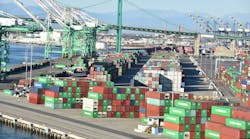US Ports Get Funding to Help Ease Supply Chain Congestion
U.S. Department of Transportation announced on Feb. 24 that it will invest $450 million for ports under that will come from the Bipartisan Infrastructure Law.
“Decades of underinvestment in our infrastructure, unprecedented consumer demand amid our strong economic recovery, and continued pressure from the pandemic have all put immense strain on our supply chains,” said Transportation Secretary Pete Buttigieg. in a statement. “This report lays out critically important steps we can take—both right now, and in the years ahead—to help strengthen our supply chains, create good-paying jobs, and ensure that Americans can affordably and efficiently access the goods they rely on.”
Using Port Infrastructure Development Program (PIDP) Grants, DOT the investments ar port of the Port Action Plan, which speeds additional efforts to strengthen our port supply chains.
- Progress at Major Ports Nationwide:
- Port of Oakland: In January, DOT partnered with USDA to help the Port of Oakland set up a new “pop-up” site to help reduce congestion at the Port while making it easier for agricultural companies to fill empty shipping containers and export their goods.
- Port of Savannah: As part of the Port Action Plan, DOT worked with the Port of Savannah to help the Port set up and operate four “pop-up” container yards in Georgia to ease congestion at the Port. Since the “pop-ups” have been in use, container dwell times have been reduced and fewer ships are at anchor outside the Port.
- Ports of Los Angeles and Long Beach: In October, DOT worked with the Ports of Los Angeles and Long Beach to propose fining ocean shippers for long-dwelling containers. Since the fine was proposed, the Ports have seen a more than 65 percent drop in long-dwelling containers.
In the announcement the Administration reflected on actions taken by Supply Chain Disruptions Task Force: In June, the President announced the Short-Term Supply Chain Disruptions Task Force, led by DOT, the Department of Commerce, and the Department of Agriculture (USDA). The task force has moved ports toward 24/7 operations, reduced long-dwelling containers sitting on the docks, convened stakeholders to discuss how to strengthen the trucking workforce, and worked to increase freight rail service. The recommendations in this report build on the lessons of these immediate efforts.
